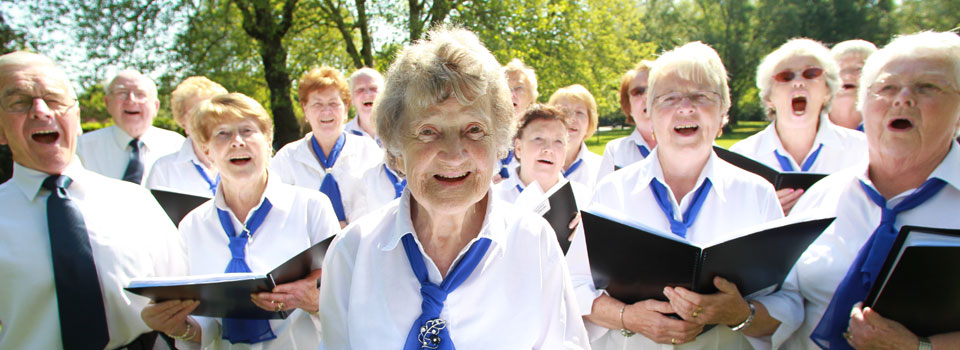DOMINIC CAMPBELL, co-founder of Creative Aging International and a 2018 Influencer in Ageing, firmly believes we can create better ways of ageing.
And he’s challenging participants at this year’s 10th International Arts and Health Conference to leave his workshop and lead their own creative ageing festival within 12 months.
Always interested in aspects of equality, he has worked with disenfranchised groups from youth to the disabled, culturally and economically disadvantaged to the elderly.
His approach is that rather than focussing on the problems of ageing, we need to build on our assets, what we have in common, and celebrate it. That commonality is found in sharing music, dance, art and joy.
“When we talk about creative ageing, everyone thinks we’re talking about their older relatives, but it’s about us – it’s about you. If you want to live healthier for longer, you have to invest in ‘you’ now,” Dominic said. “Mgrandfather died at 65 – retirement age was there for a reason; people rarely lived a lot longer.
“When we look at global demographics, it’s an incredible miracle: we are living longer than ever before. It’s historic and unique.” The fastest growing segment of the UK population, he said, is 85 and older.
But it’s not an even playing field, with a startling 30-year difference between, for instance, how old one can expect to live in Sierra Leone (where total life expectancy is 50.1) and Japan (83.7 years).
“So ageing is chronological, but what’s also impacting on lifespan is environment, body health and wellbeing and the story you tell yourself – how your feel about yourself,” Dominic said.
So what kind of old are we going to be? If we only ever hear the negatives about growing older, he questions, why would we aspire to be old?
“We have an outdated story of what living longer means … We need to ask, ‘What are the riches in ageing?” Dominic said. The only way to find these is by listening hard to people’s lived experiences. What does it mean to be 97? What do people in their 70s, 80s or 90s want to do next?
And the place to encourage those discussions, to make a difference and help people to discover new opportunities, he believes, is festivals. “Festivals are places that people go to experience things; to try new food, new dance, art, craft or tunes … Why not new ways of living longer … discovering the future you?”
Festivals are also a way of connecting groups and agencies in new ways to build that better future. As former executive director of Ireland’s Bealtaine Festival of the arts and creativity for older people, Dominic has the evidence to back his words.
From 2006-2013, he developed the festival to comprise 700 partnerships presenting 3500 events annually. The festival ultimately reached and engaged 20% of the Irish over-65s population, from those in hospital beds to those who could only shuffle between rooms, to those who danced in halls or put on productions.

Dominic said because festivals were each one-off events, it was easy to create connections and one-off solutions and relationships which could be scaffolded to new futures in the wider world and to new opportunities when the festival rolled around the next year.
“It’s a lot easier to make a festival than to change the national public health system, but if we trial things for a festival and have positive outcomes, we can build on those assets,” he said.
For instance, poor infrastructure causing isolation could cause people to age beyond their years, due to difficulties crossing roads, going up steps, or poor transport links. But by fixing these problems for the festival, the authorities could instigate new long-term solutions.
“If we can make the world fantastic for say, 90-year-olds, it’s going to be fantastic for the rest of us too,” Dominic said.
As one of the first Atlantic Fellows for Equity and Brain Health with the Global Brain Health Initiative, Dominic also takes his strategy to America. He is working with four states to create one-day gatherings, which he hopes will build to longer festivals and become annual attractions.
And the concept can be as simple as Ireland’s Dawn Chorus, which asked Seniors if they would like to learn some songs and sing them at dawn on the last Sunday in May near water.
‘Near water’ came to be defined as everything from beaches, rivers and lakes to shopping mall fountains. There was even variety in when some people perceived dawn to be – with some thinking after 9am sounded a much better idea. But, as it was adapted, the Dawn Chorus brought communities together.
“Everyone thinks there’s a ‘right way’ of doing festivals, but that’s only partly true, people also have to be bold and try different things, and if it’s not working, figure out why …” Dominic said.
Dominic Campbell will present two talks as one of 12 international speakers, and 85 speakers overall, at the 10thAnnual International Arts and Health Conference in Port Macquarie on the NSW Mid-North Coast from 12-15 November, 2018. To find out more go to www.artsandhealth.org #artshealth18
– Alison Houston, writedirection gc
